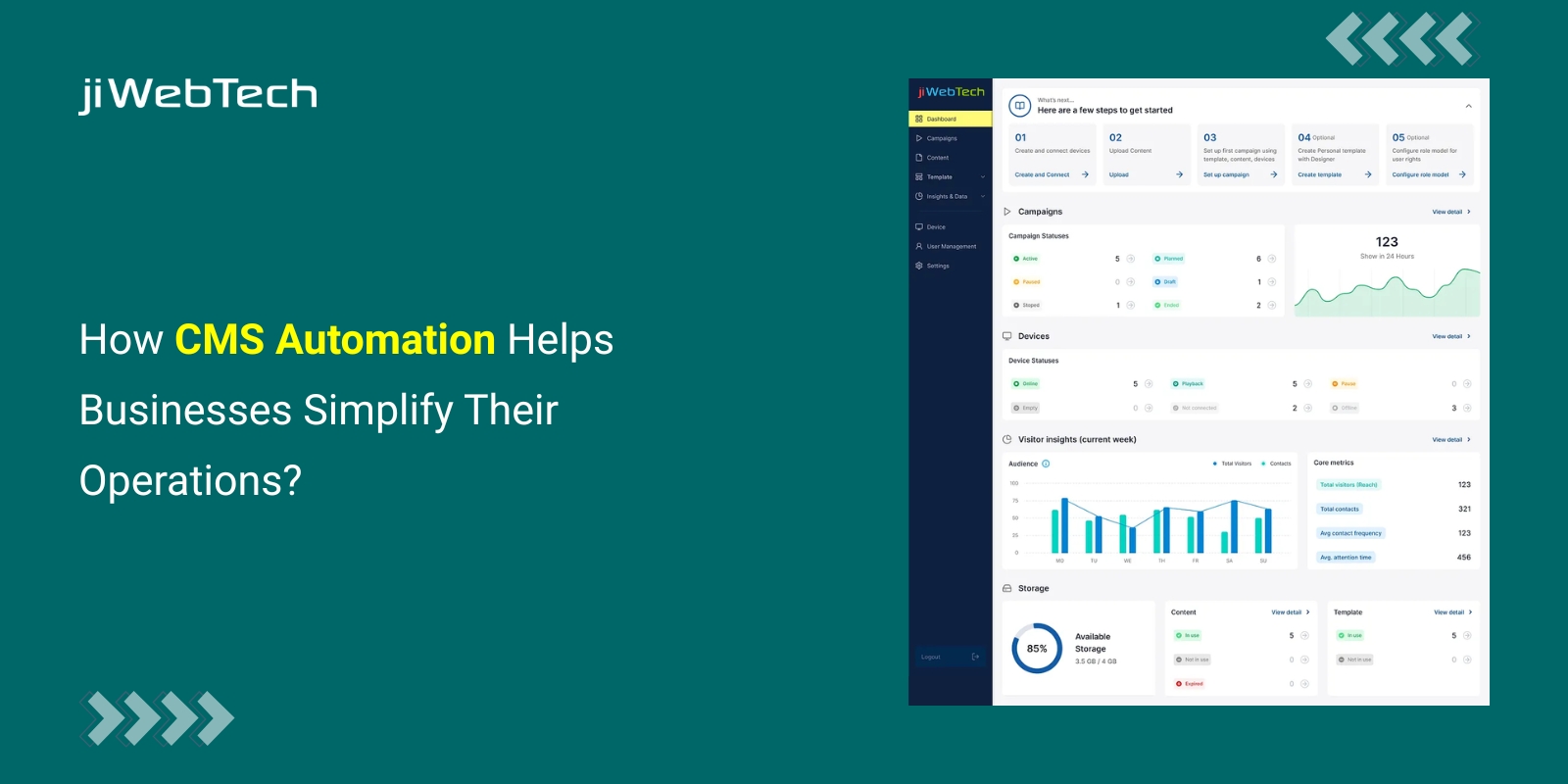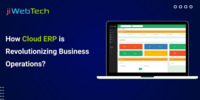- Jun 09, 2025
- Enterprise
- 1785
Share this post on:

Are you struggling to manage your company’s data? Are you looking to build a brand’s presence? Or do you want a strategic way to improve content workflow?
“Data is the king.”
If you are a business owner, you know the importance of content. No matter how good your website looks, if the content is not user-friendly or informational, there is are high chance that you might lose the lead. However, any organization has a lot of data, and managing it can be challenging. So, what’s next? How do companies manage so much data? Well, this is where a content management system (CMS) comes into the picture.
The content management system is a technology that helps businesses streamline and automate various aspects of content management. This includes creation, approval workflows, publishing, and distribution. It allows businesses to combine all pieces of content, organize, and store them for their business in an accessible digital library. Let us now go deeper into the blog and learn more about the content management system.
Key Takeaways
CMS streamlines content creation, management, and distribution.
Types include Web CMS, Enterprise CMS, Digital Asset Management, and Component CMS.
Benefits: faster info access, SEO support, automation, and better collaboration.
Development cost ranges from $10,000 to $100,000 based on design, complexity, and backend needs.
Types of Content Management Software
The content management system is part of successful business operations. Here are the types of content management software:
- Web Content Management System (WCMS): When people say CMS, they usually mean Web Content Management System. A WCMS helps you make, organize, and share content on a website. It allows businesses to keep their websites looking nice and full of good information. Besides helping you create content, it can also publish it automatically. This saves time and makes the process easier, so your team can spend more time writing and doing other important tasks.
- Enterprise Content Management System (ECMS): An Enterprise Content Management System (ECM) helps big companies organize and store all their important information. This includes storing emails, manuals, business papers, reports, and more. With an ECM, employees can easily find the information they need, saving them a lot of time and helping them make smart decisions and finish their work faster. It is also easy to update or change information whenever needed. Besides managing website content, this system helps handle many business processes.
- Digital Asset Management System (DAMS): A Digital Asset Management System deals with the organization and storage of media components. A digital asset management software handles assets, including video, audio, and graphics. It provides a centralized library system for the seamless collection, storage, and organization of media components. It ensures that all your digital assets are secure. TheDigital Asset Management System is cloud-based, and employees can access their digital data from anywhere at any time.
- Component Content Management: Component content management system focuses on content pieces, mainly on paragraphs, phrases and words. After gathering all the data, it is organized in a central location. This offers businesses with tools that help them monitor their content, lower the amount of time required to write and edit content. This tool is designed with reusability in mind.
Benefits of CMS for Business
A content management system offers a lot of benefits. A few of them are as follows:
- Find information faster: Efficiency is one of the biggest advantages offered by content management system. The implementation of an excellent CMS allow employees to access the information they need to complete their tasks. Also, employees don’t have to worry about security, as CMS keeps their data safe and secure.
- SEO Features: If you are a business, you already know the importance of high ranking. WCMSoffer various SEO-firendly tools that help them optimize the website. These tools allow businesses rank higher on search engine result pages.
- Process Automation: Businesses understand the power of automation and how it enhances efficiency and increases profitability. Various types of content management systems offer automation features. For example, automation helps businesses automatically publish content and enables employees to publish content during times when their tight schedules. They don’t have to worry about publishing content. This gives them enough time to work on their research. Also, a CMS can automatically save project documents to the cloud. This means businesses don’t have to waste time printing or scanning papers. Since everything is stored online, employees can work from home or anywhere else without any hassle.
- Foster Collaboration: Content management systems help different tools work together, making it easier for people to collaborate. Employees can quickly share their projects and ideas with their teammates, so working together feels simple and natural. They can even collaborate comfortably from home or anywhere they choose. This kind of teamwork leads to more great ideas, which is a big win for any business.
Cost to Build a Content Management System
The cost of content management system development ranges from $10,000 to $100,000. However, this cost is not fixed and can vary a lot, depending on the business requirement. But what are the factors responsible for the development cost of a content management system? Let us discuss the factors impacting the cost:
Factor | Cost Range |
|---|
UI/UX Design | Varies depending on complexity |
Complexity of App | Basic: $4,000 – $10,000 Advanced: $10,000 – $50,000 |
Development Team | Basic: $4,000 – $10,000 Advanced: $10,000 – $50,000 |
- UI/UX Design: How user-friendly your CMS is tells you if it will be a success in the market. If your CMS is easy to understand and navigate, it will give a positive image, but if your software is not user-friendly then you can miss the lead. However, what kind of design, font, color, etc. you use will impact the cost of content management system.
- Complexity of App: The CMS’s feature can range from basic to complex, depending on the complexity of your app. If you want to develop a simple app including basic features such as content editor or content creator, the development cost will range from $4000 to $10,000. However, if you want to develop premium features including API integration, or any other centralized management system. The cost of that will range from $10,000 to $50,000.
- Development Team: If you are looking to develop a scalable, secure software that operates effectively, then you need a strong backend. However, if you are looking to develop a simple and common task, then a basic backend will be required. The cost to develop CMS software using a simple backend process ranges from $4000 to $10,000. However, the cost of developing an advanced backend process ranges from $10,000 to $50,000.
Final Words
In conclusion, if you want to enhance your productivity and experience more growth as a business, choosing CMS can be a great decision. So, if you are looking to develop a content management system, look no further than jiWebTech. We are a leading Content Management System solution provider company that has helped numerous businesses globally improve their productivity with our CMS solution. So, why wait? Contact us today and let us help you simply business by automating your content workflow.
Frequently Asked Questions
1. What is CMS automation, and how does it help businesses?
CMS automation means using software to manage website content automatically. It helps businesses save time by doing tasks like updating pages and adding new content without much manual work.
2. How does CMS automation make work faster and easier?
It removes the need to do repetitive tasks by hand. For example, it can update many pages at once or send content to the right place automatically, so employees can focus on more important jobs.
3. Can CMS automation help businesses talk better to their customers?
Yes! It can show customers content that fits their interests and send messages at the right time, making customers happier and more likely to come back.
4. Will CMS automation help a business grow?
Definitely. As the business gets bigger, CMS automation can handle more content and visitors without slowing down. It also works well with other tools the business uses.
5. Does CMS automation save money?
Yes, it saves money by reducing the time and effort employees spend on simple tasks. This means fewer mistakes and lower costs, helping the business make more profit.









